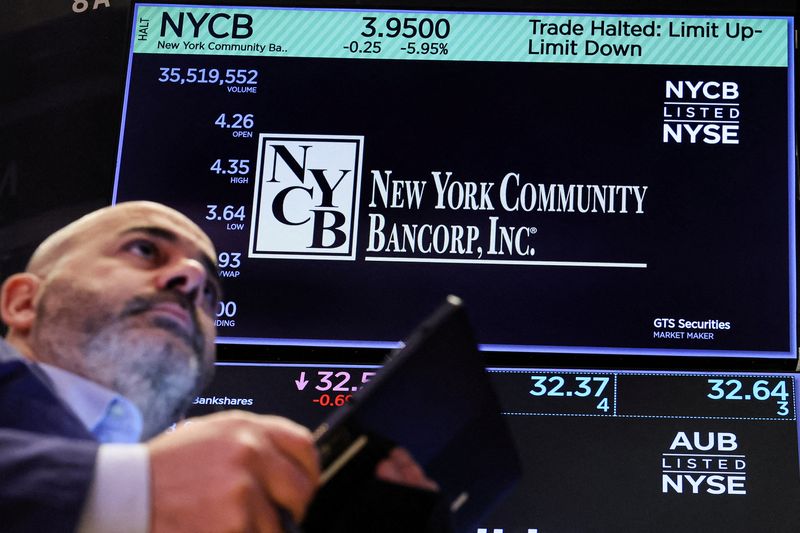By Paritosh Bansal
(Reuters) - On Feb. 1 as New York Community Bancorp (NYSE:NYCB) stock fell amid worries about its real estate exposure, a regional bank hundreds of miles away got a call from Moody's (NYSE:MCO). The ratings agency wanted to know if the bank was seeing any fallout.
Moody's asked the bank, based in the U.S. south, a series of questions, ranging from whether its clients were worried and had withdrawn any deposits to what kind of funding facilities it had in place for contingencies, the bank's CEO said.
The CEO, who requested anonymity to avoid drawing any attention to his bank, expressed surprise that the agency was asking them such questions when his bank had not seen any unusual activity. It was not "grounded in reality," he said.
The southern regional bank wasn't the only one to receive such a call. A treasurer at another regional bank said at a recent gathering of his peers, bankers talked about calls from ratings agencies, observing how quickly and expansive their questions had been.
Adding to the unease: it was unclear whether these were fact-finding missions or precursors to ratings decisions, the treasurer said.
Reuters could not determine to what extent various ratings agencies had been calling the banks and why.
These checks, which have not been previously reported, underscore how what once was a routine conversation between a ratings agency and a bank is now fraught, as anxiety around the sector lingers.
The nervousness underscores the predicament facing regional banks. While many of them have taken steps since the failures of last March to bolster their balance sheets and funding, they are struggling to shake off persistent questions about their long-term prospects.
As a group their earnings are under pressure as they pay up for deposits, while they face subdued loan demand and potential losses, especially in commercial real estate assets. NYCB showed investors are prone to sell first and ask questions later.
"Everybody's waking up to the notion that we're just not that far away from the banking crisis of last year, and the NYCB news is a stark reminder of all that," said Jason Darby, CFO of Amalgamated Bank (NASDAQ:AMAL).
Moody's, S&P and Fitch declined to comment on any conversations with issuers.
Stuart Plesser, managing director for financial institutions at S&P Global Ratings, said in an email: "While the situation is fluid, we continue to monitor the acceleration of weakness in CRE markets and its impact on banks' asset quality."
Christopher Wolfe, head of North American Banks for Fitch Ratings, wrote in an email, that "banks with less than $100 billion in assets have higher CRE concentrations than their larger counterparts and are more vulnerable to more downward pressure.”
RATINGS SURVEILLANCE
The ratings agencies don't have much of a choice, especially after facing flack for being slow to act in the run-up to the financial crisis of 2008. And some of the bankers acknowledged that it is part of their job to run checks when such events happen.
Last summer, in a similar move Moody's surveyed 55 banks about their commercial real estate exposure. The survey found that "banks face significant challenges to refinance CRE loans over the next 18 months." The agency also downgraded some banks in the aftermath of the March crisis.
Moody's latest questions to banks could mean that the agency is revisiting that effort, as NYCB's problems crystallized the potential impact of banks' exposure to commercial real estate. Depending on what they find, checks from ratings agencies could help shape their view of the health of the regional banking sector and lead to further ratings actions. Moody's downgraded NYCB to junk on Feb. 6.
BETTER OFF
The regional banking executives said the industry is in a better position than it was last March.
BankUnited (NYSE:BKU) CEO Raj Singh said the situation is also different than what happened last year. In the case of NYCB, investors worried about credit quality and capital levels versus last year when the concerns centered around the ability of banks to have enough cash to meet withdrawal demands.
"We haven't gotten a single phone call about liquidity or any concern from any of our depositors," Singh said.
Nevertheless, credit and capital can become a liquidity issue.

Amalgamated's Darby said banks that have been more forthright in their disclosures will likely fare better.
"The market just got served up a very significant reminder that there's still a great deal of pressure on banks," Darby said. "And that real estate portfolios, in particular, have potential issues that need to be examined more thoroughly.”